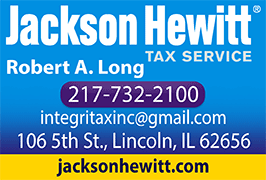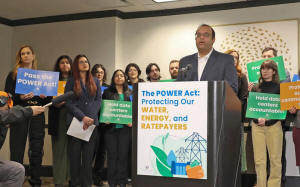POWER Act: Lawmakers seek to regulate new data centers’ power, water
usage
[February 12, 2026]
By Nikoel Hytrek and UIS Public Affairs Reporting (PAR)
CHICAGO — Amid concerns about data centers’ impact on prices,
electricity supplies and the environment, two Illinois lawmakers have
introduced a bill to regulate new projects in Illinois.
The bill, called the POWER Act, establishes comprehensive environmental,
water and energy regulations for “hyperscale” data centers. State Sen.
Ram Villivalam is sponsoring the bill in the Senate, and state Rep.
Robyn Gabel, D-Evanston, is the lead sponsor in the House.
“Now is the time for us to come together and take action to address
challenges our communities are facing that are posed by data centers and
instill common sense guardrails to minimize their impact on our
neighbors,” Villivalam, a Democrat whose 8th District includes parts of
Chicago and the northern suburbs, said Wednesday at a news conference.
Data centers enable vast amounts of storage and processing to meet the
needs of web hosting, cloud storage and AI, or artificial intelligence.
Prices
To address concerns about prices, the bill would require new data
centers to pay for their own energy costs, including infrastructure
needed to generate that energy. It also requires energy to come from
renewable sources and prohibits data centers from shifting costs to
residents.
An analysis by the Union for Concerned Scientists, which supports the
POWER Act, showed data centers could increase electricity system costs
by $24 billion to $37 billion by 2050.

James Gignac, the Midwest policy director for the climate and energy
program at the Union of Concerned Scientists, said the demand for power
could lead to natural gas and coal-fired power plants staying online
without renewable energy investments.
“Data center load growth would mean more air and climate pollution,
which in turn will threaten our climate goals, our communities and our
health,” he said at the news conference Wednesday.
A December report by three Illinois agencies concluded the state could
face power shortages and price increases because of a combination of
factors that include new data centers coming online.
Gov. JB Pritzker, who has long championed data centers coming to
Illinois and signed a tax incentive proposal to lure them here early in
his tenure, indicated he’d be open to further regulation.
“If they do threaten to raise rates, we’ve got to slow them down and
make sure they understand what their responsibilities are. We’re going
to be looking at it in the legislature in the spring,” he said at a
Monday event in Granite City.
Illinois has provided tax incentives for data centers since Pritzker
signed bipartisan legislation in 2019. According to the state’s 2024
report, at least 27 data centers had received incentives totaling $983
million in estimated lifetime tax breaks and benefits.
Groups like the Illinois Manufacturers’ Association said the proposal
would “hamper development” of data centers and Illinois should “focus on
an all-of-the-above energy approach.”
Water
The bill requires data centers to report their water usage, including
how much they take in and discharge. Large centers can consume millions
of gallons of water a day to cool computer servers and prevent
overheating.
[to top of second column]
|

Sen. Ram Villivalam, D-Chicago, joins advocates on Feb. 11, 2026, in
Chicago to introduce a bill regulating data centers in Illinois.
(Medill Illinois News Bureau photo by Gabriel Castilho)

“Currently, data centers are not required to disclose, track or
report water use,” said Andrea Densham, senior policy adviser for
Alliance for the Great Lakes. “Without this information, communities
cannot accurately plan for or anticipate demand or make informed
siting decisions.”
The POWER Act would also require data centers to obtain water
permits from the Illinois Environmental Protection Agency, which
would regulate how the centers handle wastewater, and meet water
efficiency standards
“Without proper planning, management and monitoring tools, water
shortages, groundwater conflicts and increased prices, pollution and
contaminated aquifers are all a real risk,” Densham said.
Pollution
To protect the environment and the people who live near data centers
from pollution, the bill requires full environmental assessments for
how the data center would impact the community. It also requires new
data centers to establish community benefits agreements where
they’re developed.
“Data centers must pay their fair share and contribute to solutions,
not just bring more problems for our communities to bear,” said Lucy
Contreras, Illinois state program director for GreenLatinos, a
national nonprofit that organizes around environmental issues in the
Latino community.
The bill also creates the Public Benefits and Affordability Fund,
paid for by data centers through annual fees based on peak demand,
to support the local community with energy bill assistance, air
quality monitoring and water infrastructure.
“That is really where communities will have a say,” Contreras said.
Feasibility
Democratic and Republican figures in states across the country also
are considering new data center regulations.
When asked about whether the POWER Act would discourage development
in Illinois, Villivalam said the state isn’t saying “no” to data
centers.
“We’re saying, ‘Here are our closely held, staunch principles on how
we can get there,’” he said.

He acknowledged there would need to be conversations with labor and
industry, but Illinoisans are demanding the state to do something
about electricity bills.
“We are seeing data centers build here and in different regulatory
environments,” said Jennifer Walling, the executive director of the
Illinois Environmental Council. “They are looking here and they’ll
continue to look here, even if we have regulations in place.”
All contents © copyright 2026 Associated Press. All rights reserved |